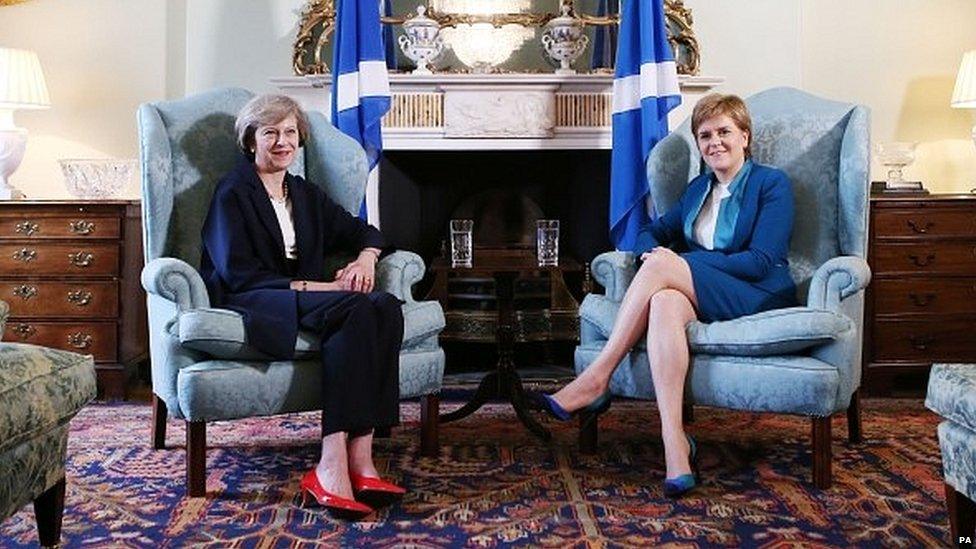Scotland's future: What are Theresa May's options?
- Published

If it was designed to grab headlines it certainly did that. Nicola Sturgeon slammed the ball into Theresa May's court on the question of another independence referendum.
There were accusations on both sides yesterday. The first minister accused the prime minister of "intransigence", of being a "brick wall". The PM accused the Scottish government of "playing politics" (yes that old chestnut) and Secretary of State for Scotland David Mundell said Ms Sturgeon was "obsessed".
The first minister has turned up the attacks today, questioning the prime minister's mandate for governing, in this tweet. , external
Forget about the political verbiage between the two for a second though. What might Theresa May's options actually be?
Is there actually going to be a second independence referendum vote, when it is the last thing that Number 10 wants to happen?
1. She could say 'No' immediately: This is extremely unlikely. Both sides know this would likely give the SNP a big bump in the polls and wouldn't remotely take the issue off the table.
2. Say 'Yes' immediately: This is also extremely unlikely. Number 10 doesn't want this vote to take place and backing down now is almost unthinkable for a prime minister whose first visit was to Scotland, making it clear preserving the union is near the top of her list
3. Say 'Not now, but not never': This is basically the position the government has taken so far, as David Mundell suggested yesterday. Westminster does not want to make it easy for the Scottish government. And what they won't agree to is the SNP's timetable of holding a vote before the Brexit negotiations are done.
4. Play it long: This seems to be the second part of the strategy. Don't allow Nicola Sturgeon to set the terms of the narrative. She did yesterday, but with Theresa May holding off from triggering Article 50, the next fortnight could leave Nicola Sturgeon twisting in the wind, looking as if she moved too fast. While trying to avoid accepting a referendum, the Tories will try to keep the arguments focused on why they believe a vote should not take place. The SNP, however, may equally try to make this look as if Westminster is ignoring their demands, which of course, strengthens their case still further.
5. Do a deal behind closed doors: This isn't the official position and no one on either side would acknowledge such a thing. But there are whispers that this has already happened. The theory goes that the UK government has accepted the inevitable and will allow the referendum to go ahead, but only on the basis that the agreement to do so includes a "sunrise clause" - so Nicola Sturgeon wins the right to hold the vote but in law, can't do so until the UK has left the EU. There's even a suggestion Westminster may stipulate that the second vote can't take place until after the next Holyrood election. That would be fiercely resisted by the SNP who could argue their victory in 2016 gave them a clear mandate for a second vote.
6. Call Ms Sturgeon's bluff: Theresa May could suddenly suggest that despite the frustrations of their talks so far, that there could be a different deal for Scotland, and she will appeal to the EU Commission on Scotland's behalf to pursue that path. If Number 10 explored this publicly, it would be much harder for the Scottish Government to make its case. One SNP insider said it would "shoot our fox". But a UK government source downplayed the possibility of doing so. It would be a significant change in the UK approach and could open the door to complicated concessions and demands on many different fronts.
Let's be clear, Theresa May really doesn't want to have a referendum. Senior SNP figures insist that Nicola Sturgeon, as she said yesterday, is completely serious about still being open to compromises if they can be made.
But with the political temperature already at boiling point, it's hard to see how they can find a solution that works for both sides.